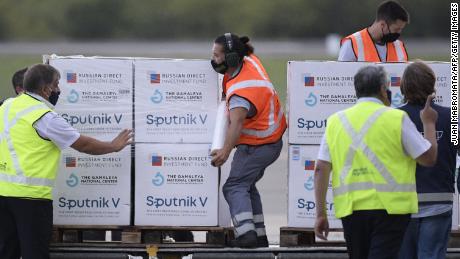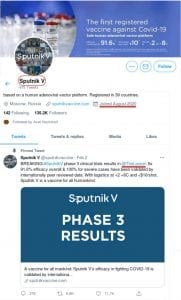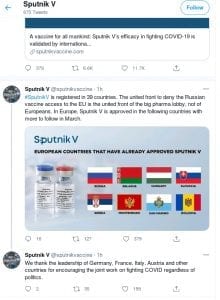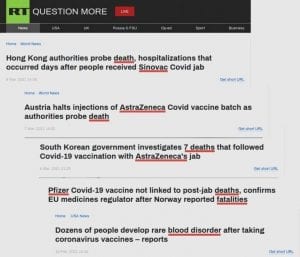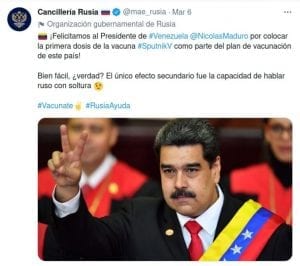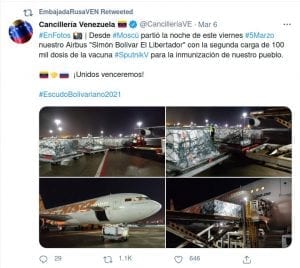The COVID-19 vaccine has given the world hope for salvation from the pandemic that had claimed millions of lives, as well as for return to the usual way of life and overcoming the long economic crisis.
However, immediately after the development of life-saving vaccines, the problem arose of their fair distribution, namely, between rich and poor countries. The desire of the European countries and the United States to vaccinate their own populations, first of all, causes serious preoccupation and discontent among the leaderships of less developed countries. Russia immediately took advantage of this situation by being the first to register its own vaccine. At the same time, it should be noted that Moscow is not too concerned about immunizing its own population. Sputnik V has become for Moscow rather a tool for solving political problems than caring about its citizens. This is proved with the low rates of vaccination in Russia and the active promotion of its own vaccine in foreign markets. Preferential terms for Sputnik V supplies offered by Russia have become an excellent alternative to Western vaccines for Latin American countries. And Russia seeks to strengthen its political position in the international arena, using the pretext of combating the pandemic and solving the problem of vaccination of the population in other countries.
Moscow is actively promoting its vaccine in foreign markets despite the difficulties that have arose during its certification due to the lack of a third mandatory stage of research confirming its safety and effectiveness. Because of this, many countries, notwithstanding the critical need for vaccines, are not ready to purchase a Russian drug that has not passed all the stages of mandatory trials.
But this time outlets and social networks “have come to the aid” of Moscow. The publication in the respected British magazine Lancet of data about the third phase of trials of the Russian Sputnik V with a high assessment of its quality appeared very in time. This has become a jumping-off point for an information campaign to “capture” a market in Latin America by the Russian vaccine.
To achieve its goals, Moscow did not invent anything new, resorting to proven methods — the use of social networks and controlled outlets. In particular, an “issue-related” account has been specially created to popularize and promote the Russian vaccine.
It is intended for publication of materials describing how good the Russian vaccine is. Every day it provides data on how many countries have decided to use the Russian vaccine.
Here is the confirmation of the growing desire to be vaccinated with the Russian drug.
The intended spread of such content actively contributes to the formation at Twitter’s users of a positive attitude to the Russia’s Sputnik V vaccine.
Moscow has also staked on the controlled outlets: the Sputnik News and RT en Español, advertising vaccine success with numerous reports on supply of the Russian drug in Latin America and Mexico, appeals to partnership, materials about an unprecedented positive immune response even after only one shot of Sputnik V.
At the same time, describing the positive effect of the inoculation with the Russian drug, RT writes about serious side effects and even fatal cases, hinting that such incidents are connected with vaccines of non-Russian origin.
Thus in the article “A rare blood disorder develops in dozens of people after taking coronavirus vaccines - reports”, RT writes about the cases of trombocytopenia, diagnosed in 36 people who were injected with Pfizer or Moderna vaccine. Despite the fact that the connection between the vaccination and the blood disorder was not confirmed, Russian media outlets characterized the vaccines as “technologically new and untested” - consequently, not trustworthy.
The goal of articles which include the words “coronavirus”, “vaccine”, “death”, “AstraZeneka”, “Pfizer” and “Moderna” in its titles is to deliver a message that any of these vaccines - except Russian Sputnik V - threatens health and life. Moscow imposes a narrative about insecurity of other vaccines.
All these messages appear to be a blatant disinformation, since they have nothing in common with the reality, they were not confirmed by medical trials, were taken out of the context and used to spread panic and distrust of the vaccines of other manufacturers.
As The New York Times reports, Russia has already applied this strategy in autumn, last year, when discredited Britain’s AstraZeneka. It had run a disinformation campaign prior to the moment when the developers of Sputnik V have made a cooperation deal with AstraZeneka - it changed vector of messages, shared by Russian media outlets, to the opposite one.
Russian media outlets mention Sputnik V in positive context only:
“Si no se gestiona la vacuna, no habrá respuesta que valga”: Indígenas de Ecuador piden aprobar la Sputnik V” (“Native inhabitants of Ecuador ask to approve #SputnikV”);
“Last Saturday, president of Venezuela Nicolas Maduro and his wife Cilia Flores received the first shot of Russian coronavirus vaccine Sputnik V” - was widely spread in Twitter.
The posts put stress on the price of Russian vaccine, which is cheaper than American ones, and its low dependence on cold storage conditions.
Recently Russia announced manufacturing of improved variant - one-shot Sputnik Light. No doubt, the roll out in this case is cheaper and more rapid, however, no proof of the quality and safety of vaccine is also available.
Still, Russia developed a large campaign in support of the vaccine, the offices of the Ministry of Foreign Affairs of Russia as well as the Russian embassies in Uganda, Venezuela, Mexico, Haiti and the Dominican Republic are involved in active propaganda through their Twitter-accounts. Their messages are look alike:
the Russian vaccine has proven its efficacy up to 91,4%;
Russia will expand its manufacture facilities to export more doses of the vaccine to Latin America;
the vast majority of countries are ready to use Russian vaccine and are outraged at the delays associated with the inspections of the regulative authorities, etc.
The delays in permissions to the use of Sputnik V are often explained by Moscow as a sabotage of the vaccination campaign - saying that the refuse to adopt Russian vaccine is commonly caused rather by political motives, than objective reasons.
Therefore, to promote Sputnik V, Russia provides disinformation campaign against competitive vaccines. This media campaign can be described as a mix of narratives, spread actively in social media and Russian media outlets. The main accent was made on the spread of the information about side effects, caused by the use of American vaccines and even on danger they allegedly pose. Simultaneously, the messages about positive effect from the Russian vaccine are pushed ahead. However, it is obvious that any drug implies side effects, and the absence of the information regarding the issue indicates that important clinical data, which refers to the use of Russian vaccine Sputnik V, was hidden.
Source: Democratic-Europe
